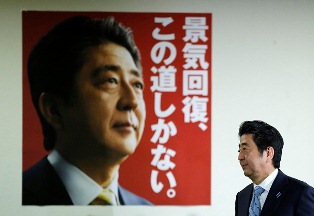 Source: www.lowyinterpreter.org
Source: www.lowyinterpreter.org And so on to the main topic of this post. On Monday the results of Japan’s Lower House election revealed that, as expected, the LDP-New Komeito Coalition under PM Shinzo Abe had again secured a 2/3rds majority, thereby effectively continuing the Abe government’s control of the Diet. One of the other big winners from Sunday’s election was the Japan Communist Party, securing 21 seats and giving the JCP the numbers to be able to introduce legislation into the Lower House. This result by the JCP was interpreted as more of a protest vote by those disaffected with LDP-New Komeito rule than an actual endorsement of JCP policies. By far the biggest loser from the weekend was the Party for Future Generations, which suffered a thumping loss of 17 seats, leaving it with just 2 representatives (J). Furthermore, party leader Ishihara Shintarō, former Tokyo governor and prominent right-wing commentator, lost his seat, thereby leading to his announcement of Tuesday that he was resigning from politics (can we only hope?).
Another remarkable statistic that came out of the election was the historically low voter turnout. The voting rate average was around 52% across the nation, making it the lowest rate recorded since the end of the Second World War (J). While weather may have been a factor, this statistic was interpreted as a sign that the Japanese populace have lost interest in the political process in Japan, deeming each of the opposition parties too weak to combat the LDP-New Komeito Coalition and dissatisfied with opposition party leaders and policies. That might be one reason why DPJ leader Kaieda Ban lost his seat as well, thereby leading to his resignation as leader. Such is the dearth of talent in the DPJ, however, that as of Wednesday morning no one has stepped forward to indicate their preference to take over as leader.
What does all this mean? Well, clearly Abenomics is here to stay for the foreseeable future. Given the election result, Abe may not be able to claim a mandate for his policies, but he will be able to state that his party, having been returned by the populace, can embark on the most ambitious part of the ‘three arrows’ plan of Abenomics – structural reform. What this means is that Abe must take on powerful interests in the agricultural lobby, de-regulate sections of the financial industry, establish concessions for small to medium sized start-ups, and change Japanese workplace culture to allow for greater workplace participation by women, including guarantees of employment after child birth, greater levels of child support, and an expansion in daycare facilities to enable more women to work.
Abe’s re-election also enables him to engage in the process of re-starting some of Japan’s nuclear power plants and continue with his plans for a more pro-active Japanese presence abroad. As former Australian Ambassador to Japan Murray McLean has pointed out here, while the Diet has yet to approve Abe’s plans for the Self Defence Law and Coast Guard Law to be reinterpreted along the same lines that the Constitution was on July 1st 2014, the control that the LDP-New Komeito has of both houses suggests that such approval may be forthcoming. All will, of course, depend on whether the New Komeito’s own reservations about a more robust SDF operating abroad overrule its cooperation with its larger political partner.
This is how things stand at the moment – whether they are in place 12 months from now no one can say, but with a renewed LDP-New Komeito government in power, there is every chance that Japan’s economic, social, and political dimensions will look very different by the end of 2015. Change of course will be resisted, but the voter turnout on the weekend does indicate that opposition to Abe’s policies won’t be all that substantial. What will be particularly interesting to watch is how both China and South Korea react to Abe’s re-election. Given that both now face the prospect of Abe in power until 2018, both China’s and South Korea’s governments might decide that it would be better to begin dialogue with Abe rather than try to isolate him. Abe has moved too quickly and forcefully for both countries’ governments to discount him, and so compromise may need to be made in the interests of maintaining stability in the East Asian region.
This is likely to be my last post for this year, hence I thank all those who have stuck with me over the past 12 months, and hope that you might join me again next year. I will try to put up more posts related to Japanese history, I promise! I am certainly looking forward to 2015, and so will see you again from mid-January onwards. では々、新年にもよろしくお願い致します。
 RSS Feed
RSS Feed